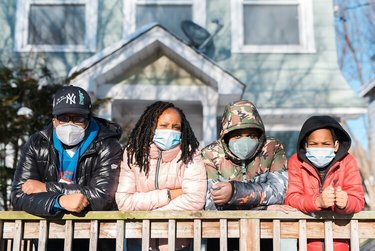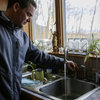Land bank forms partnership to help deal with racial disparities
— Photo from Home HeadQuarters website
Preem Cabey, working with Home HeadQuarters, has bought an Albany County Land Bank “fixer-upper” house in the historic Knox Street District neighborhood of Albany.
ALBANY COUNTY — To deal with racial disparities in home ownership, the Albany County Land Bank is partnering with a not-for-profit housing development organization based in Syracuse.
Home HeadQuarters Inc. says it is the leading home-improvement lender to families of color living in Syracuse, out-lending all other financial institutions combined. Founded in 1996, it is the nation’s first designated Community Based Development Organization.
Albany County set up its land bank in 2014 to redistribute tax-foreclosed, vacant, or abandoned properties, returning the properties to productive use.
The new partnership will “provide more opportunities for historically underserved populations and minority contractors to purchase real estate and build wealth,” according to a release from the land bank.
About 60 percent of all properties acquired by the Albany County Land Bank are located within a neighborhood that was historically redlined, the release says.
The initiative is being led by the Land Bank’s Underserved Communities Committee, formed last June, to address racial disparities created by generations of discriminatory housing and lending practices, made worse by the pandemic.
The committee convened land bank leadership, elected officials who represent underserved communities and leaders from the Black real estate, contracting, and business community. A series of working group meetings were held over the course of several months to identify barriers that Black individuals, families, and investors can encounter when seeking to purchase and redevelop vacant, abandoned, or tax-foreclosed real estate.
Purchasers of Albany County Land Bank buildings are required to rehabilitate the properties to the local municipal code. The committee also identified increasing the capacity of minority-owned contractors as a way to create more equity and support homeownership.
Many smaller minority-owned businesses can’t access the capital needed to expand and become a certified Minority Owned Business in New York State, consequently limiting opportunities to participate in larger projects. At the same time, many buyers of Land Bank properties, especially properties in neighborhoods that were redlined, express difficulty securing qualified contractors willing to undertake the rehabilitation of a vacant building.
Home HeadQuarters will offer financing to qualified buyers for the purchase and rehab of land bank properties in Albany County. HeadQuarters is a certified Community Development Financial Institution that serves people and businesses that cannot access resources from traditional financial institutions by applying more flexible underwriting standards.
An article on the Home HeadQuarters website details the story of a Black woman, Preem Cabey, who has bought an Albany County Land Bank “fixer-upper” in the historic Knox Street District neighborhood of Albany as part of the Land Bank’s Equitable Ownership Program.
“Albany has one of the largest gaps between white and Black families’ homeownership rates in the nation,” says Albany County Land Bank Executive Director Adam Zaranko in the article. “What’s the number one thing keeping us in that position — access to capital!”
In the five years the Albany County Land Bank has been in operation, not one of its first-time homebuyers has been able to find or secure traditional first mortgage financing within Albany’s historically redlined neighborhoods, the article says.
That is why Home HeadQuarters became a partner.
The partnership will increase access to capital to create more equitable opportunities for underserved populations. “Owning a home can be a significant way to build intergenerational wealth, but Black households and other households of color in America have largely been denied this opportunity through systemic and discriminatory housing and lending practices such as ‘redlining,’ which are widely recognized as a major cause of the current racial wealth gap,” says the release.
“Eliminating barriers to accessing capital is a significant step towards addressing the tremendous racial housing disparities that exist in our communities and will enable more properties to go back to provide use while creating more equitable and inclusive opportunities,” said Zaranko in the release.
Last year, a study at Northwestern University found that, over the 40 years from 1976 to 2016, while there has been a national decline in housing discrimination, “In the mortgage market, we find that racial gaps in loan denial have declined only slightly, and racial gaps in mortgage cost have not declined at all, suggesting persistent racial discrimination.”
A report released in February by the New York State Department of Financial Services found that in the city of Buffalo — described as having “long been one of the most racially segregated cities in the United States” — less than 10 percent of all loans were given to minorities although minorities make up 20 percent of the region’s population.
Nationally, the current gap between white homeownership, at 71 percent, and Black homeownership, at 41 percent, is about 30 percent — the largest disparity in the past 50 years.
An analysis conducted by the Urban Institute on the gap between the white and Black homeownership rates in the 100 American cities with the largest number of Black households found that Albany had the second largest gap, at 48.8 percent, between Black (20.1 percent) and white (68.9 percent) homeownership.
“The harmful legacy of discriminatory practices like redlining,” the release said, “remains very evident in several neighborhoods within communities served by the Albany County Land Bank.”



